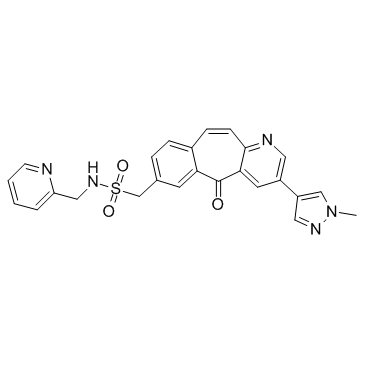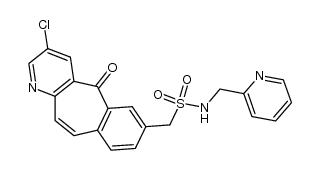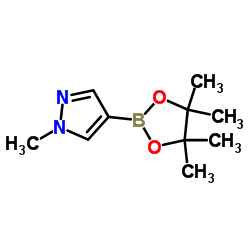1001917-37-8
| Name | 1-[2-(1-methylpyrazol-4-yl)-11-oxobenzo[1,2]cyclohepta[2,4-b]pyridin-9-yl]-N-(pyridin-2-ylmethyl)methanesulfonamide |
|---|---|
| Synonyms |
CS-0560
1-[3-(1-methyl-1H-pyrazol-4-yl)-5-oxo-5H-benzo[4,5]cyclohepta[1,2-b]pyridin-7-yl]-N-(pyridin-2-ylmethyl)methanesulfonamide UNII-350H6PBQ5Q MK-8033||MK8033 QCR-58 MK8033 MK-8033 |
| Description | MK8033 is a novel and specific dual ATP competitive c-Met/Ron inhibitor (IC50=1 nM Wt c-Met) under investigation as a treatment for cancer.IC50 Value: 1 nM (Wt c-Met); 2.0 nM (c-Met N1100Y) [1]Target: c-Met/Ronin vitro: MK-8033 binds 3-fold more tightly to phosphorylated c-Met kinase domain (Kd= 3.2 nM) than to its unphosphorylated counterpart (Kd = 10.4 nM). Signigicantly, MK-8033 potently inhibits kinase activity of three oncogenic c-Met activation loop mutants, Y1230C, Y1230H, and Y1235D (IC50s ranging from 0.6 to 1 nM at 50 uM ATP) in addition to other c-Met activating mutants N1100Y and M1250T. MK-8033 potently inhibited GTL-16 proliferation with an IC50 of 582 ± 30 nM. By contrast the HCT116 cell line, which does not harbor basal c-Met activation, was not inhibited by MK-8033 (IC50 > 10000 nM) [1]. MK-8033 radiosensitized the high-c-Met-expressing EBC-1 and H1993 cells but not the low-c-Met-expressing cell lines A549 and H460. However, irradiation of A549 and H460 cells increased the expression of c-Met protein at 30 minutes after the irradiation. Subsequent targeting of this up-regulated c-Met by using MK-8033 followed by a second radiation dose reduced the clonogenic survival of both A549 and H460 cells. MK-8033reduced the levels of radiation-induced phosphorylated (activated) c-Met in A549 cells [2].in vivo: MK-8033 was orally dosed in GTL-16 tumor xenograft bearing mice. Mice were euthanized 1 h after dosing and tested for p-Met (Y1349) in tumors and MK-8033 concentrations in plasma. At 100 mg/kg,essentially complete inhibition of p-Met (Y1349) was achieved. An in vivo IC50 of 1.3 uM was deduced from the relationship between plasma MK-8033 level and Met pY1349. Treatment with escalating dosed of MK-8033 for 21 days lead to antitumor efficacies in a dose-dependent manner. Dosing at 3, 10, 30, and 100 mg/kg resulted in 22, 18, 57, and 86% tumor growth inhibition, respectively, relative to tumor from vehicle-treated mice.signatures. |
|---|---|
| Related Catalog | |
| References |
| Density | 1.39 |
|---|---|
| Molecular Formula | C25H21N5O3S |
| Molecular Weight | 471.53100 |
| Exact Mass | 471.13700 |
| PSA | 115.22000 |
| LogP | 4.63500 |
| Storage condition | 2-8℃ |
|
~% 
1001917-37-8 |
| Literature: Dinsmore, Christopher J.; Katcher, Matthew H.; Northrup, Alan B. Patent: US2009/12076 A1, 2009 ; Location in patent: Page/Page column 53-54 ; |
| Precursor 2 | |
|---|---|
| DownStream 0 | |

